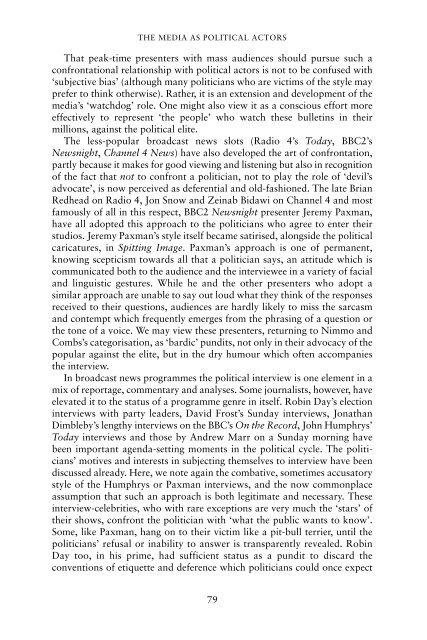20130412164339753295_book_an-introduction-to-political-communication
20130412164339753295_book_an-introduction-to-political-communication
20130412164339753295_book_an-introduction-to-political-communication
Create successful ePaper yourself
Turn your PDF publications into a flip-book with our unique Google optimized e-Paper software.
THE MEDIA AS POLITICAL ACTORS<br />
That peak-time presenters with mass audiences should pursue such a<br />
confrontational relationship with <strong>political</strong> ac<strong>to</strong>rs is not <strong>to</strong> be confused with<br />
‘subjective bias’ (although m<strong>an</strong>y politici<strong>an</strong>s who are victims of the style may<br />
prefer <strong>to</strong> think otherwise). Rather, it is <strong>an</strong> extension <strong>an</strong>d development of the<br />
media’s ‘watchdog’ role. One might also view it as a conscious effort more<br />
effectively <strong>to</strong> represent ‘the people’ who watch these bulletins in their<br />
millions, against the <strong>political</strong> elite.<br />
The less-popular broadcast news slots (Radio 4’s Today, BBC2’s<br />
Newsnight, Ch<strong>an</strong>nel 4 News) have also developed the art of confrontation,<br />
partly because it makes for good viewing <strong>an</strong>d listening but also in recognition<br />
of the fact that not <strong>to</strong> confront a politici<strong>an</strong>, not <strong>to</strong> play the role of ‘devil’s<br />
advocate’, is now perceived as deferential <strong>an</strong>d old-fashioned. The late Bri<strong>an</strong><br />
Redhead on Radio 4, Jon Snow <strong>an</strong>d Zeinab Bidawi on Ch<strong>an</strong>nel 4 <strong>an</strong>d most<br />
famously of all in this respect, BBC2 Newsnight presenter Jeremy Paxm<strong>an</strong>,<br />
have all adopted this approach <strong>to</strong> the politici<strong>an</strong>s who agree <strong>to</strong> enter their<br />
studios. Jeremy Paxm<strong>an</strong>’s style itself became satirised, alongside the <strong>political</strong><br />
caricatures, in Spitting Image. Paxm<strong>an</strong>’s approach is one of perm<strong>an</strong>ent,<br />
knowing scepticism <strong>to</strong>wards all that a politici<strong>an</strong> says, <strong>an</strong> attitude which is<br />
communicated both <strong>to</strong> the audience <strong>an</strong>d the interviewee in a variety of facial<br />
<strong>an</strong>d linguistic gestures. While he <strong>an</strong>d the other presenters who adopt a<br />
similar approach are unable <strong>to</strong> say out loud what they think of the responses<br />
received <strong>to</strong> their questions, audiences are hardly likely <strong>to</strong> miss the sarcasm<br />
<strong>an</strong>d contempt which frequently emerges from the phrasing of a question or<br />
the <strong>to</strong>ne of a voice. We may view these presenters, returning <strong>to</strong> Nimmo <strong>an</strong>d<br />
Combs’s categorisation, as ‘bardic’ pundits, not only in their advocacy of the<br />
popular against the elite, but in the dry humour which often accomp<strong>an</strong>ies<br />
the interview.<br />
In broadcast news programmes the <strong>political</strong> interview is one element in a<br />
mix of reportage, commentary <strong>an</strong>d <strong>an</strong>alyses. Some journalists, however, have<br />
elevated it <strong>to</strong> the status of a programme genre in itself. Robin Day’s election<br />
interviews with party leaders, David Frost’s Sunday interviews, Jonath<strong>an</strong><br />
Dimbleby’s lengthy interviews on the BBC’s On the Record, John Humphrys’<br />
Today interviews <strong>an</strong>d those by Andrew Marr on a Sunday morning have<br />
been import<strong>an</strong>t agenda-setting moments in the <strong>political</strong> cycle. The politici<strong>an</strong>s’<br />
motives <strong>an</strong>d interests in subjecting themselves <strong>to</strong> interview have been<br />
discussed already. Here, we note again the combative, sometimes accusa<strong>to</strong>ry<br />
style of the Humphrys or Paxm<strong>an</strong> interviews, <strong>an</strong>d the now commonplace<br />
assumption that such <strong>an</strong> approach is both legitimate <strong>an</strong>d necessary. These<br />
interview-celebrities, who with rare exceptions are very much the ‘stars’ of<br />
their shows, confront the politici<strong>an</strong> with ‘what the public w<strong>an</strong>ts <strong>to</strong> know’.<br />
Some, like Paxm<strong>an</strong>, h<strong>an</strong>g on <strong>to</strong> their victim like a pit-bull terrier, until the<br />
politici<strong>an</strong>s’ refusal or inability <strong>to</strong> <strong>an</strong>swer is tr<strong>an</strong>sparently revealed. Robin<br />
Day <strong>to</strong>o, in his prime, had sufficient status as a pundit <strong>to</strong> discard the<br />
conventions of etiquette <strong>an</strong>d deference which politici<strong>an</strong>s could once expect<br />
79
















